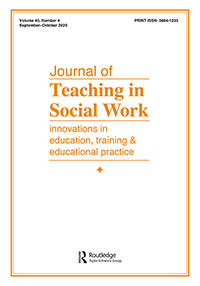Including Neuroscience in Social Work Education: Introducing Graduate Students to the Neurosequential Model of Therapeutics
Item
Title
Including Neuroscience in Social Work Education: Introducing Graduate Students to the Neurosequential Model of Therapeutics
Loyola Faculty Contributor
Brian L Kelly; Christie Mason
Link
List of Authors
Christie Mason; Brian L. Kelly; Virginia McConchie
Abstract
To fill a gap in research on the incorporation of neuroscience in social work education, this article describes Master of Social Work (MSW) student and alumni experiences learning a neuroscience-informed model for practice with clients who have endured developmental trauma. The Neurosequential Model of Therapeutics (NMT) is a clinical decision-making tool that provides an estimate of how a client’s current neurobiological functioning may have been impacted by trauma during the developmental period in order to inform the selection and sequencing of interventions. MSW students and alumni participated in focus groups exploring their perspectives on learning the NMT, the utility of the model in their work, and the fit between the model and social work theory and practice. Participants found the model helpful in conceptualizing client cases and applicable to their work, but challenging to implement due to others’ lack of familiarity with the model, and insufficient infrastructure. These findings suggest the NMT may be a valuable tool for teaching neuroscience within schools of social work.
Date
7-Jan-20
Publication Title
Journal of Teaching in Social Work
Publisher
Taylor and Francis
Identifier
10.1080/08841233.2020.1788692
Bibliographic Citation
Mason, C., & Kelly, B. L., McConchie, V. (2020). Including Neuroscience in Social Work Education: Introducing Graduate Students to the Neurosequential Model of Therapeutics, Journal of Teaching in Social Work, 40(4), 352-371. https://www.tandfonline.com/doi/full/10.1080/08841233.2020.1788692

